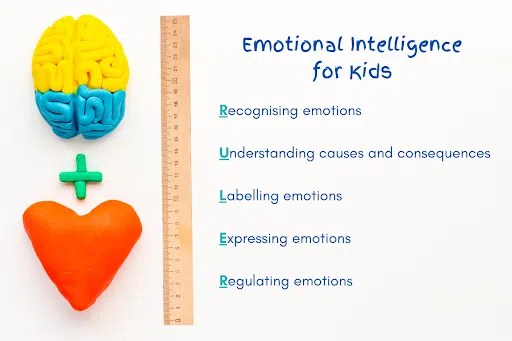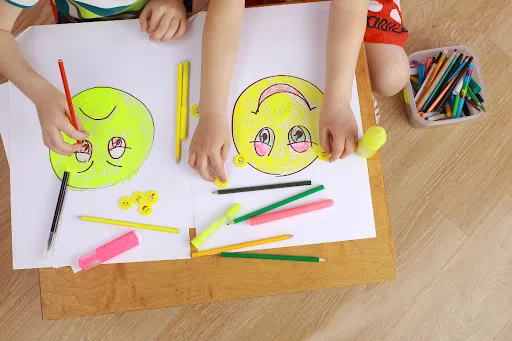
Raising emotional intelligence in childhood helps your little one establish a solid foundation for thriving relationships, impactful communication, and overall well being. In this blog post, we’ll dive deep into the significance of emotional intelligence in young children’s lives and equip you with some practical tips and great books to cultivate your child’s EQ.
What is Emotional Intelligence and Why is it Important?
“When you raise the emotional intelligence of a child, the IQ naturally increases” – Prof. Makoto Shichida Shichida, Creator of the Shichida Method.
Emotional intelligence (EQ) and intelligence quotient (IQ) are distinct yet equally important aspects of a child’s development.
- EQ refers to the ability to identify, understand, manage, and express one’s emotions and empathise with the feelings of others.
- IQ represents a person’s cognitive abilities, such as logical reasoning, problem-solving, and analytical thinking.
Children’s emotional intelligence training helps them build strong interpersonal skills, develop resilience, and make sound decisions. On the other hand, IQ is crucial for academic success. Moreover, it helps children process information, learn from experiences, and apply knowledge in different situations.
A high EQ allows children to navigate social situations, communicate effectively, and form healthy relationships. A high IQ enables children to excel academically and tackle complex challenges.
Both EQ and IQ are equally essential for well-rounded development. Both complement each other and contribute to different areas of a child’s life.
Signs of emotional intelligence in children include:
- Recognising and naming their emotions
- Understanding the emotions of others
- Expressing their feelings appropriately
- Regulating their emotions effectively
- Demonstrating empathy and compassion
Parents can set the stage for a healthier and more fulfilling adulthood by developing children’s emotional intelligence early in life. High emotional intelligence is linked to better mental health, academic performance, and social skills.
For this reason, instructors at Shichida Australia work to engage the hearts of children in order to engage their minds. There is fun, love, acceptance, and praise incorporated into our teachings. Parents also play a vital role in the program because your children look to you the most, and by engaging their hearts with love and praise, you’ll see their EQ and IQ rise dramatically.
Developing EQ through Shichida’s classes
Shichida classes use a variety of sensory inputs to engage children in learning. By using visual, auditory, and kinesthetic stimuli, children are encouraged to explore and learn in a way that suits their learning style. This approach helps children develop empathy, which is a key component of emotional intelligence.
Positive reinforcement: Firstly, Shichida classes use positive reinforcement to motivate children and build their self-esteem. Children are praised for their efforts, no matter how small, and are encouraged to take risks and try new things. Notably, this approach helps children develop a growth mindset, which is essential for emotional intelligence.
Mindfulness: Secondly, Shichida classes use mindfulness techniques to help children learn to focus their attention and manage their emotions. By teaching children to be present in the moment, they learn to regulate their emotions and develop a sense of calmness and inner peace.
Play-based learning: Thirdly, Shichida classes use play-based learning to engage children in the learning process. Through play, children learn to communicate, collaborate, and empathise with others. This approach helps children develop social skills, which are a key component of emotional intelligence.
Parental involvement: Finally, Shichida classes encourage parental involvement in the learning process. Parents are provided with tools and strategies to support their child’s learning and emotional development. This approach helps parents develop a deeper understanding of their child’s needs and provides them with the skills to help their child develop their EQ.
How to Improve Children's Emotional Intelligence
Parents can effectively support their children in developing emotional intelligence by adopting specific approaches and strategies.
Tips and techniques
Here are some valuable tips and techniques to consider when helping your child build their EQ.
Encourage emotional expression: Create a safe environment for your child to express their emotions openly. In addition to that, listen empathetically and validate their feelings.
Model healthy emotional behaviour: Kids learn by observing their parents. Be mindful to exhibit appropriate emotional responses to help show them effective emotion regulation.
Discuss emotions in daily life: Bring conversations about feelings into everyday activities. Take the opportunity to discuss how various situations make you and your child feel.
Practice empathy: Teach your child to empathise with others by asking how they think someone might feel in a particular situation and why they may feel that way.
Encourage problem-solving: Kids develop resilience and adaptability when you support them in solving emotional challenges.
Praise emotional intelligence: Appreciate and acknowledge your child’s efforts to understand and manage their emotions, reinforcing the importance of emotional intelligence.

The RULER approach to emotional intelligence for kids
Parents can also keep the RULER approach in mind for children’s emotional intelligence training, which represents the five essential skills of EQ:
Recognising emotions in oneself and others. You can engage your child in conversations about various emotional cues, such as facial expressions and body language, to help them identify emotions in different situations.
Understanding the causes and consequences of emotions. Discuss the things that lead to different emotions and the potential outcomes of these emotions, helping your child to grasp the complexity of emotional experiences.
Labelling emotions. Help your child build a rich vocabulary to describe their emotions. Using words to describe their feelings will enable them to better understand and communicate them.
Expressing emotions in an appropriate manner. Guide your child on how to share emotions respectfully and effectively, considering the specific context and cultural norms.
Regulating emotions. Work with your child to develop coping mechanisms and emotion regulation techniques, helping them manage their emotions healthily and adaptively.

Overall, the RULER approach offers a comprehensive and accessible way for parents to support developing children’s emotional intelligence, fostering essential skills that will benefit them throughout their lives.
Emotional Intelligence Activities for Kids
By incorporating certain activities into your child’s daily routine, you can help increase their emotional intelligence in a natural, enjoyable, and engaging manner. Let’s explore some activities to improve emotional intelligence in children.
Emotion Charades: Have your child act out different emotions while you and other family members try to guess the emotion being portrayed.
Feelings Thermometer: Create a chart with different emotional states ranging from calm to overwhelmed. Encourage your child to mark their emotions on the chart daily, helping them recognise and track their feelings.
Emotion Storytelling: Read stories together and discuss the characters’ emotions, encouraging your child to empathise and relate to the characters’ feelings. We share some of our favourite children’s books that teach emotional intelligence in a moment.
Role-playing: Use dolls or action figures to create scenarios encouraging your child to express and manage emotions in various situations.
Gratitude Journal: Encourage your child to write or draw about things they are grateful for each day, fostering positive emotions.
Emotion Collage: Encourage your child to create a collage using images and words representing different emotions. This activity helps children identify and understand various emotions while promoting creativity and self-expression.

Feelings Wheel: Create a wheel with various emotions written or illustrated. Have your child spin the wheel, then discuss the chosen emotion and share personal experiences related to that emotion. This activity fosters emotional awareness and open communication about feelings.
Emotion Matching Game: Prepare a set of emotion cards with images or words depicting different feelings. Lay the cards face down, and ask your child to find matching pairs by turning over two cards at a time. This game enhances memory skills and emotional vocabulary.
Acts of Kindness: Encourage your child to perform small acts of kindness for family members and friends. This activity promotes empathy and compassion because it helps children understand the impact of their actions on others’ emotions.
In the Shichida program, some of the specific activities we teach to raise EQ and IQ in tandem include:
- Mindfulness exercises, e.g deep breathing. Used to help children learn to regulate their emotions and develop a sense of calmness and inner peace.
- Positive reinforcement while attempting activities and critical thinking challenges. This helps to motivate children and build their self-esteem. Children are praised for their efforts, no matter how small, and are encouraged to take risks and try new things. Furthermore, this approach helps children develop a growth mindset.
- Emotional intelligence activities for kids. Our games and activities are designed to concurrently develop both IQ and EQ. Additionally, we teach empathy, kindness, taking turns, patience, sharing, and much more during play.
Through our lessons and developing children’s emotional intelligence, we work to draw out every child’s character potential and individuality. Our brain training emphasises the importance of developing and enhancing EQ and IQ. By engaging a child’s heart in the learning process, we can better engage their mind.
Children’s Books That Teach Emotional Intelligence
Incorporating children’s books that teach emotional intelligence into your child’s reading routine can also be an effective way to foster EQ. These books, available in Australia, explore emotions and empathy through engaging stories and relatable characters:
“The Feelings Book” by Todd Parr: This colourful and straightforward book introduces various emotions, notably, in a way that young children can easily understand.
“In My Heart: A Book of Feelings” by Jo Witek: This beautifully illustrated book explores a range of emotions, helping children understand and express their feelings.
“The Way I Feel” by Janan Cain: This book uses engaging illustrations and rhyming text to introduce children to a wide range of emotions and feelings.
“When Sophie Gets Angry – Really, Really Angry…” by Molly Bang: This story follows Sophie as she learns to manage her anger and calm down after experiencing a frustrating situation.
“A Sick Day for Amos McGee” by Philip C. Stead: In this heartwarming story, the main character, Amos, receives empathy and care from his animal friends when he is feeling unwell.
“How Full Is Your Bucket? For Kids” by Tom Rath and Mary Reckmeyer: This book uses the concept of an invisible bucket to teach children about the impact of their words and actions on others.
“The Invisible String” by Patrice Karst: This touching story explores the idea of emotional connection between people, even when they are physically apart.
“Listening with My Heart” by Gabi Garcia: This delightful book follows a young girl as she learns the importance of self-compassion and empathy. Through her journey, children are taught to listen to their hearts, understand their emotions, and also extend kindness to themselves and others.
You can support the development of emotional intelligence
By incorporating these tips, activities, and books into your child’s life, you can support the development of emotional intelligence in young children.
Fostering EQ in early childhood will pave the way for a more successful and fulfilling life, both personally and professionally. At Shichida, we concurrently incorporate EQ & IQ raising teaching methods as part of our classes. They are designed to help children develop their emotional and intellectual abilities holistically. Learn more about what we teach or book a trial class at one of our early childhood learning centre’s today!.


